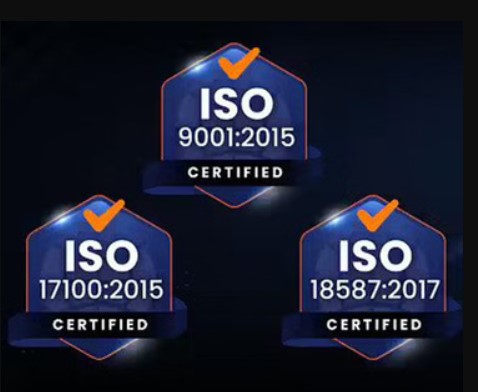
ISO certification for translators refers to a standard set by the International Organization for Standardization (ISO) to ensure high-quality and reliable translation services. The most common standard for translation services is ISO 17100, which outlines the requirements for the provision of professional translation services.
Here’s what it typically includes:
1. Quality Management:
- ISO 17100 sets criteria for the management of translation projects, focusing on things like quality assurance, project management, and continuous improvement.
- It ensures that translation agencies have clear processes in place to produce high-quality translations consistently.
2. Qualifications and Competence:
- Translators must meet certain qualifications and professional standards. For example, they need to demonstrate a strong command of both the source and target languages.
- Translators are often required to have relevant training or certifications in addition to their linguistic expertise.
3. Project Workflow:
- The standard outlines the steps involved in the translation process, including preparation, translation, revision, and proofreading.
- It emphasizes that multiple stages of quality control should be implemented before delivering the final product.
4. Confidentiality:
- The ISO certification ensures that translators and translation agencies implement measures to maintain confidentiality, particularly when handling sensitive or proprietary content.
5. Technology:
- It often encourages the use of translation tools and technology, such as CAT (computer-assisted translation) tools, to increase efficiency and consistency in translations.
Why is it important?
- Consistency and Quality: ISO certification assures clients that the translation service provider follows best practices in terms of quality control, translation methodology, and project management.
- Credibility: Having an ISO certification can enhance the reputation of a translation service, making it more attractive to clients, especially in industries that require high precision, like legal, medical, or technical translations.
- Global Recognition: ISO standards are recognized worldwide, making the certification valuable for companies seeking international clients or dealing with global markets.
ISO 17100 vs. Other Standards
- ISO 9001 is another quality standard that focuses more broadly on quality management systems across industries, whereas ISO 17100 is specifically tailored to the translation industry. ISO 9001 can be part of the process, but ISO 17100 focuses on the specifics of translation service provision.
If a translation agency or freelance translator is ISO certified, it means they adhere to these global best practices, ensuring that clients receive high-quality and reliable translation services.

